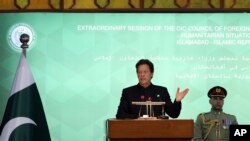Pakistan's Prime Minister Imran Khan is set to travel to Russia on Wednesday to meet with President Vladimir Putin, as the West condemns the Russian leader over the deepening Ukraine crisis.
The Pakistani Foreign Ministry said Putin and Khan "will review the entire array" of relations between the two countries, including energy cooperation.
"They will also have wide-ranging exchange of views on major regional and international issues, including Islamophobia and situation in Afghanistan," the statement added.
Russia's official news agency TASS quoted Kremlin spokesman Dmitry Peskov as telling reporters Tuesday that Putin's meeting with Khan "is scheduled for Thursday."
Officials in Islamabad are maintaining that Khan's two-day trip, the first such visit to Moscow by a Pakistani prime minister in 23 years, was taking place at the invitation of President Putin and was planned before the Ukraine standoff happened. Khan will be the first foreign leader to visit Moscow since Putin recognized the independence of Ukraine's breakaway republics of Donestsk and Luhansk.
Speaking to Russian state-controlled RT channel Tuesday, Khan dismissed suggestions his visit had anything to do with global politics in the wake of Russia's escalating tensions with Europe and the United States over Ukraine.
"This [Ukraine crisis] does not concern us. We have a bilateral relationship with Russia, and we really want to strengthen it," Khan said.
"Now, what we want to do is not become part of any bloc. We want to have trading relations with all countries," the Pakistani leader said.
Khan went on to says he hopes the Ukraine crisis is resolved peacefully.
"I do not believe that military conflicts solve problems. … The countries that rely on a military conflict have not studied history properly," Khan argued. "The developing world really wishes that there is not another Cold War."
The Pakistani leader said international oil prices already have risen sharply because of the prospect of a Russia-Ukraine conflict and that it would have "huge repercussions" on the developing world. Khan also noted that both Ukraine and Russia are among major suppliers of wheat to the world.
Meanwhile, Russian tanks rolled into eastern Ukraine early Tuesday, ostensibly on what the Kremlin calls a "peacekeeping mission" to protect the two breakaway republics that Moscow fashioned eight years ago and now is formally recognizing as independent states.
Pakistan and Russia were once bitter adversaries, as Islamabad closely aligned itself with the United States during the Cold War.
The Pakistani intelligence agency worked closely with the American CIA in arming and training Afghan fighters to successfully end a decade-long Russian occupation of neighboring Afghanistan in 1989.
Islamabad and Moscow, however, have restored ties in recent years, with both routinely holding joint military exercises and attempting to develop energy cooperation to help Pakistan overcome shortages.
Meanwhile, Pakistan's ties with Washington have deteriorated over allegations the South Asian major Non-NATO ally covertly helped the Islamist Taliban in waging a deadly insurgency against U.S.-led international forces in Afghanistan. The Taliban regained power last August.
Islamabad denies the accusations and blames what it says was a flawed U.S. military policy in dealing with the Afghan conflict that ultimately led to a chaotic withdrawal of international troops from the neighboring country in August after 20 years.
Russian and Pakistani officials acknowledge their efforts to deepen bilateral economic cooperation face multiple challenges. Several major Russian companies are under U.S. sanctions and unable to invest in Pakistan.
Critics say a meaningful bilateral defense cooperation also faces roadblocks, such as Russia's longstanding ties with Pakistan's bitter rival India, a major importer of Russian military hardware. They say Moscow does not want to upset New Delhi by offering any major defense-related, or for that matter, economic deals to Islamabad.
Combating regional terrorism and the flow of narcotics from Afghanistan seems to be what is primarily driving Russia's diplomatic engagement with Pakistan, according to analysts.
Pakistan also has developed close economic and military ties with Ukraine in recent years and is a major importer of Ukrainian wheat.
Emine Dzheppar, the first deputy foreign minister of Ukraine, tweeted on Monday after meeting the Pakistani ambassador to Kyiv and said the two sides discussed ways to enhance bilateral and multilateral cooperation.
"Grateful to Pakistan for supporting Ukraine's sovereignty and territorial integrity," Dzheppar wrote.




